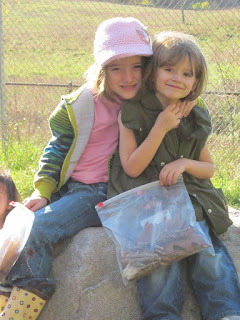 I have long-term goals for my children's education, but I try to focus on what they're capable of now. For example, I want them eventually to write a page a day in a creative writing journal. But right now they're still learning how to write and read, so it's not a realistic expectation for them this year. It is realistic for them to read/be read to from the Bible every day and color a picture related to that reading in their "prayer journals".
I have long-term goals for my children's education, but I try to focus on what they're capable of now. For example, I want them eventually to write a page a day in a creative writing journal. But right now they're still learning how to write and read, so it's not a realistic expectation for them this year. It is realistic for them to read/be read to from the Bible every day and color a picture related to that reading in their "prayer journals".That picture is always drawn by an adult for the 5yr and usually drawn by the 6yr for herself, then colored in with crayons by both girls. They are learning how to process what is read to them, narrate it orally, narrate it on paper, and maintain a regular journal. All of these lessons will help them when they begin a creative writing journal, whether we start with pictures or wait until they can compose and write several sentences every day.
.
I try not to add more than one new activity OR one new development of a current activity to their schoolwork at a time. As much as I would like to give them new tasks in art, science, math, music, gym, writing, etc., I would just discourage them and burn myself out by throwing everything at them at once. We added ukulele lessons to the girls' routine this summer. They had each received one from us at Christmas but we didn't formalize what to do with it until we returned to our routines after our baby was born. At that point it became a matter of learning a new chord or other lesson with Daddy once or twice a week, then practicing for 10 minutes on their own each school day. Until they were accustomed to that routine, I specifically avoided making any other changes in their school assignments or adding any new subjects.
.
 Because my vision is long-term rather than bound by a formal curriculum, there's less pressure (theoretically) to add new lessons too quickly. We're learning habits, not particular topics. Because the habit is to practice math skills every schoolday, not "addition in 1st grade, subtraction in 2nd grade, multiplication in 3rd", it no longer matters how slowly or quickly our children progress through any given subject. And because the habit becomes a matter of course, they will definitely make progress (they certainly have so far!) without wondering each day what assignments are required. By knowing the routine, they need less instruction from me.
Because my vision is long-term rather than bound by a formal curriculum, there's less pressure (theoretically) to add new lessons too quickly. We're learning habits, not particular topics. Because the habit is to practice math skills every schoolday, not "addition in 1st grade, subtraction in 2nd grade, multiplication in 3rd", it no longer matters how slowly or quickly our children progress through any given subject. And because the habit becomes a matter of course, they will definitely make progress (they certainly have so far!) without wondering each day what assignments are required. By knowing the routine, they need less instruction from me..
Eventually the list of assignments each child needs to complete will grow and the time expected of them for each of those assignments will increase. A typical fourth grader should not be working at a kindergarten level, nor should a highschooler be done after completing the same assignments as a fourth grader. If we continue on the path we're on now, our highschool students will be working hard, and well-prepared for college. Yet with that vision in mind they can move as slowly as they want now, based on their readiness now, as we add in one new detail of one habit at a time into their routines.
No comments:
Post a Comment